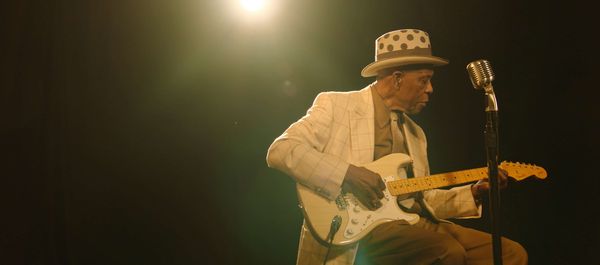Eye For Film >> Movies >> Buddy Guy: The Blues Chase The Blues Away (2021) Film Review
Buddy Guy: The Blues Chase The Blues Away
Reviewed by: Andrew Robertson

Buddy Guy is the kind of musician that musicians you've heard of have heard of. A Chicago bluesman originally from Louisiana, he may not be a household name but he is known to many names you know. The custodian of a legacy that includes names like Howlin' Wolf and Muddy Waters, it was John Lee Hooker's Boogie Children that set him on his course.
A looping course at that. In a well constructed documentary that frames a series of interviews with Buddy, some archived, the tale has the structure of a song. There are paintings, true, and beautiful ones, the settings of his interviews are each in their own way stark and telling. "Let me go back", he says, and into the rhythm of the film comes the refrain.
There are traditions here, inheritances. Parallels too, from cotton-picking on sharecropping land as a child to the exploitations of labels like Chess Records. There are some arguments, contretemps among the honky-tonk, but Guy is so genial and self-effacing and so talented that the film feels much the same.
There are interviews with artists who cite Buddy Guy as influence. There are several who give statements as to what the Blues are, or mean. Some of these and some photo montages are given a dress of distress to make them seem like archive, others are from decades past and further. There's some 40 songs listed in the credits, which makes the occasional glockenspiel nostalgia of Lucas Ellman's original score seem not only invasive but alien.
As it's put though, "being mad won't help you none", and there's scarcely time to notice. There are so many anecdotes here, not just about his career but about how the Blues works, worked, was work. The British Invasion where the Stones made their appearance on Shindig! contingent on a booking for either Muddy Waters or Howlin' Wolf seems incredible. That these bands were re-exporting the blues to White America was one thing, but their willingness to use that power to get the originals their due is another. There's a sequence of the Stones and Buddy playing on stage and there is a glint and a joy in every face. Eye For Film saw this shortly after Charlie Watts passed away, and while the footage focuses on the guitars he's always there in the background marking time for the others to loop around.
Wolf called Buddy his "personal chef", one of any number of artistic collaborations. Guy credits Wolf, Waters, well nearly everyone you've heard of as "hanging the moon". He can go to Mars. He talks about the source and antecedents of each feature of his style, where he got them and where they got him. These are then echoed in the interviews with younger artists, from Clapton to Kingfish. That influence all building from that first time he found the sound and held it, "walking with the note".
Guy's CV though often strayed from the path. I was minded of some of the stories in The Sparks Brothers about dedication to art independent of commercial success. That said, the prospect of the Brothers Mael in a tow-truck seems less like hard work and more like an electropop Laurel & Hardy. For Buddy though the guitar on the passenger seat was a reminder, and an opportunity. One that he and his imitator(s) got to take.
Devin Chanda, Matt Mitchener, and Charles Todd have all variously done music documentaries and concert films, variously collaborating with each other and artists from P!nk to Romeo Santos. Their film is a fitting tribute to an undersung artist.
Since Searching For Sugarman there has been a wave of musical documentaries that aim not so much to revise history as redress it. This is one of the latter, the kind of film that immediately after watching I find myself trying to determine how I can get it in front of my parents to watch. That was true of 50 Feet From Stardom, The Wrecking Crew, and here. A co-production with Sky Arts, it's likely that it will appear on the channel at some point. Until then, one might have to wait.
That patience will be rewarded. From farm road to pool hall, stage to studio, club to colleagues, Buddy Guy's interviews are illuminating. There are some astonishing stories from an era where musicians served live apprenticeships. Like The Beatles and their eight days a week, regular gigging gave talent room to grow. That repetition is found through the film, "let me go back", he says, and he does, to the road he first walked down that meant we know his name.
Reviewed on: 27 Aug 2021If you like this, try:
The Blues BrothersLaurent Garnier: Off The Record
The Upsetter: The Life Of Lee Scratch Perry
















